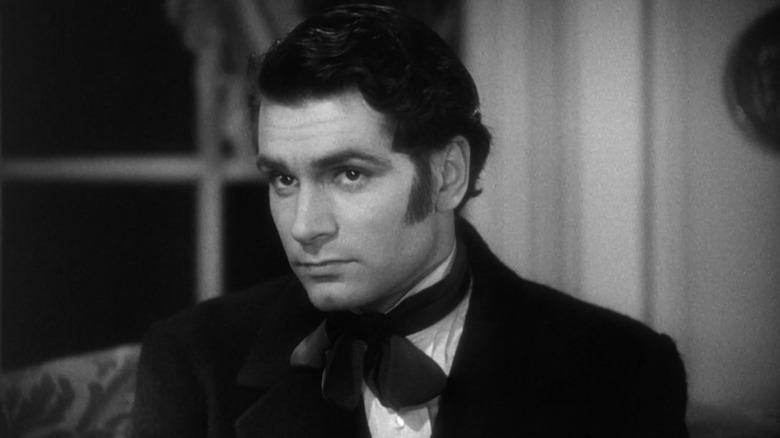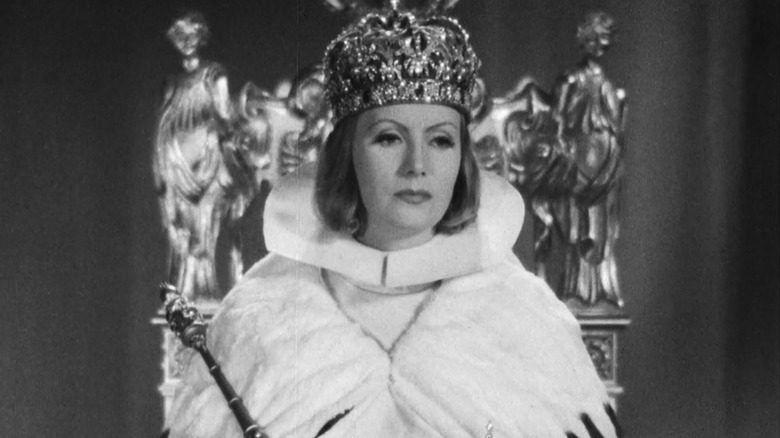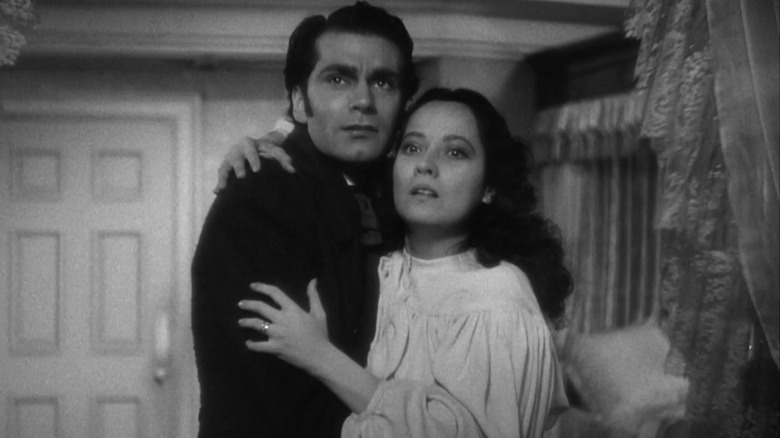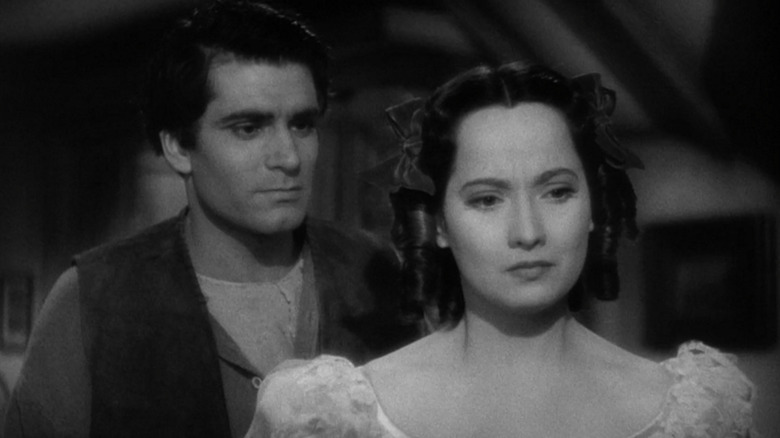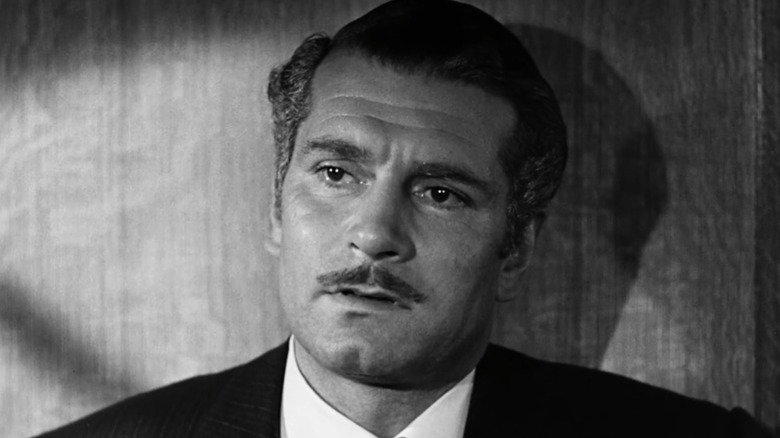Laurence Olivier Was In No Hurry To Make His Hollywood Film Debut
If you were to make a Mount Rushmore of the most important and influential actors in the 20th century, Laurence Olivier would have to be on that list. The legend of stage and screen approached all of his work with a complete command of language and an unmatched assuredness in how he carried himself. Generations upon generations look to Olivier on how to be a proper, trained thespian, especially when it comes to becoming adept at performing Shakespeare. Even after the rise of Marlon Brando, method acting, and naturalism, Olivier still shows so many actors that there is another equally brilliant way to approach characters. There's a reason that the awards for the best of the British stage are called the Oliviers.
The stage may have been where Olivier earned his sterling reputation as a performer, but film is what lets him live on. However, for as someone as accomplished and beloved on stage as he was, it took a surprisingly long amount of time before he appeared in a major Hollywood film. Olivier seemed rather content to just appear in the theater and do British produced films. It took nearly a decade of him being a big name actor before signing on to star in William Wyler's 1939 adaptation of the classic Emily Bronté novel "Wuthering Heights," which earned Olivier his first of 10 Oscar nominations for acting.
Getting Olivier to agree to be in "Wuthering Heights" was no easy task, as he initially turned down the part of Heathcliff. This was not a case of having his salary lowballed, not liking the material, or thinking William Wyler was a great filmmaker. No, Laurence Olivier had a previous run-in with Hollywood that nearly turned him off the town forever.
A bad experience with Garbo
Prior to "Wuthering Heights," Olivier did have a very brief Hollywood career starting in 1930 when he signed a contract with RKO Radio Pictures. His first American film was a pre-code romantic drama called "Friends and Lovers," in which Olivier was third-billed. He made one more movie with RKO and was loaned out to Fox for another. Olivier knew himself that things were not going swimmingly. In his book "On Acting," he wrote:
"RKO gave me no great acting parts, and I gave them no marvelous close-ups. I could talk all right, but my performances were precious, lacking in vitality, charmless."
One important person did see potential in him, though. Greta Garbo selected Olivier to be her leading man in "Queen Christina," the film about the eponymous 17th Century Queen of Sweden. Not only was he to play opposite a massive star in Garbo, but this was an MGM picture, the premiere studio of Hollywood's golden age. This was sure to be his moment.
If you have seen "Queen Christina," you know that isn't the case at all, because Olivier is not in the movie. John Gilbert plays the leading man. Two weeks into shooting, Olivier was fired after they shot a love scene between the two actors, where everyone involved knew they had absolutely no chemistry with one another. Olivier wrote:
"There was no famous flicker of an eyelid or of the corner of her mouth, however faint; only shyness and cold eyes. I was miserable and overacted. She became bored with my twitchiness and saw my lack of personality, a mouse to her lioness."
MGM wanted him to stay and test for their upcoming "Romeo & Juliet" adaptation, but believing Shakespeare didn't belong on screen (the irony!), he left Hollywood and didn't intend to return.
The allure of William Wyler
I am of the opinion that William Wyler does not get nearly the amount of respect he deserves from film lovers. In the discussion of classic Hollywood, you hear plenty about Alfred Hitchcock, Frank Capra, John Ford, Howard Hawks, and George Cukor, but Wyler's name appearing on lists like that is rather inconsistent. The man directed some of the greatest films of all time, like "The Best Years of Our Lives," "Roman Holiday," and "Ben-Hur" (plus two personal favorites of mine in "The Heiress" and "How to Steal a Million"). He's also only one of three filmmakers to win the Best Director Oscar more than twice, yet almost no one will tell you he is their favorite director.
Wyler was coming off directing Bette Davis to her second Oscar for her performance in "Jezebel" when he approached Olivier about starring in "Wuthering Heights." Not only did he want Olivier for the film, but also his romantic partner at the time, Vivien Leigh. Even though he was a great admirer of Wyler's work and thought the script was "excellent," Olivier was not thrilled by the prospect. He wrote:
"This wasn't enough to get me back on the first boat and train to dreadful Hollywood, because it smelt of [Samuel] Goldwyn corn – with a pinch of Merle Oberon tartness – and Vivien was to play Isabella, not Cathy, which certainly didn't fit into the way she should have been planning her career."
Wyler came out to England to discuss the film with Olivier, but even that did not get him to go all-in, despite entrenching himself in the character of Heathcliff for the meeting. It was not until Vivien Leigh really persuaded him about how foolish passing on a part and director he so clearly liked would be.
Stripping Olivier of his ego
Laurence Olivier agreed to do "Wuthering Heights," but Vivien Leigh was not coming along for the ride. It worked out for her, since she ended up getting a little picture you may have heard of called "Gone with the Wind" a few months later. Now, Olivier was working for William Wyler, a director he so admired, but being directed by him was not exactly what the British thespian had anticipated, given Wyler's kindly manner in their meetings. Olivier describes Wyler as "vicious" towards him while giving "Merle Oberon all the attention she wanted." Little did Olivier realize that the viciousness was not without purpose, and something he came to admire and thank Wyler for. Olivier recalled:
"Wyler was a marvellous sneerer, debunker; and he brought me down. I knew nothing of film acting or that I had to learn its technique; it took a long time and several unhandsome degrees of the torture of his sarcasm before I realized it. 'Do you think you could try seeing if our little medium could capture one of your frowns instead of a frown and a glare?' He knew I couldn't be told anything. He knew I'd come to my senses, in time, to some true feeling. Very flattering. I didn't know it at the time. I merely thought him a cruel bastard!"
Don't let this be some kind of justification for treating actors poorly. What it does show on Wyler's part was seeing what an actor needed. Olivier's ego needed puncturing. He felt superior to the film medium and was also treating his co-star Merle Oberon quite badly, saying they were "spitting at each other all day." Bringing him down a peg opened his eyes to the work, rather than traumatizing him. This isn't a Shelley Duvall situation.
Not the end of Olivier and Wyler
Although the experience of making "Wuthering Heights" was not a pleasant one, the film ended up being extremely well received, earning eight Academy Award nominations, including Best Picture (or "Outstanding Production" as it was known back then). William Wyler and Laurence Olivier picked up nominations for themselves as well. Only the great Gregg Toland took home an award for his gorgeous black-and-white cinematography, though, thanks to the "Gone with the Wind" juggernaut.
Olivier had his Hollywood breakthrough, and he became fully entrenched in the system. He had his "catharsis" and would go on to star in "Rebecca," "Pride & Prejudice," "That Hamilton Woman," and more before eventually getting behind the camera himself for "Henry V." On a personal level, animosity did not remain between he, William Wyler, and Merle Oberon, with Olivier even writing that they "became friends" after the release of "Wuthering Heights."
Wyler and Olivier reunited for the 1952 romantic drama "Carrie" (which features no blood-soaked prom queens) opposite Jennifer Jones, and that production also was not a particularly pleasant experience. You really can tell that it wasn't great because Olivier does not even bring the movie up at all in "On Acting." The end result is one of the most anonymous pictures in both of their filmographies, so I am not shocked that they didn't have much to say about it. It was Olivier's first leading role after winning Best Picture and Actor for "Hamlet." He was riding high and could choose any project, and the decision to collaborate again shows there was a mutual respect between them. After all, had William Wyler not set his sights on Laurence Olivier, he probably wouldn't have had the legendary career he did. He would be respected and admired. But a legend? I'm not so sure.
